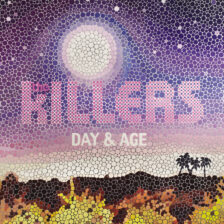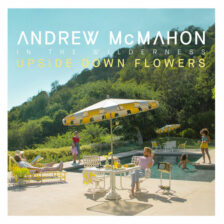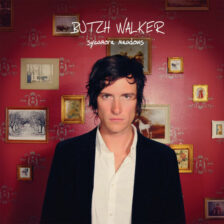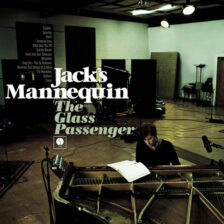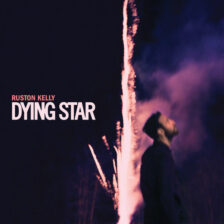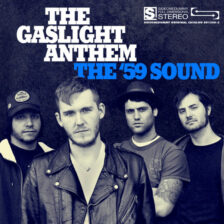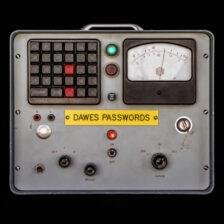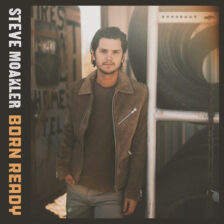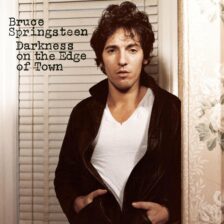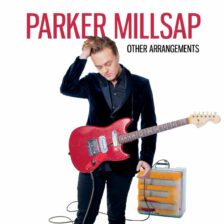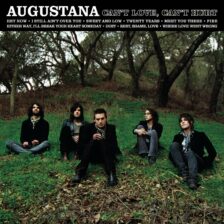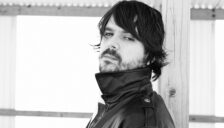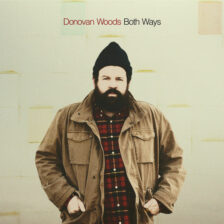I believe “What the hell happened?” was my first reaction upon hearing Day & Age, the third album from The Killers, for the first time. This record didn’t compute for me. It was bizarre and misshapen, a mess of ideas that never coalesced into anything that made sense as a unified work of art. It sounded to me, on first listen, like a B-sides record. If The Killers hadn’t released an actual B-sides collection just a year before, I might have wondered if the band just gotten lazy and pulled out some ideas they’d shelved for earlier records. But apparently Day & Age was the statement the band really wanted to make at that time, and what an odd statement it was.
Review: Andrew McMahon in the Wilderness – Upside Down Flowers
When Andrew McMahon announced his new LP, Upside Down Flowers, he referred to the album’s producer, Butch Walker, as a “fellow traveler.” That word choice was fitting, because if one word could describe McMahon over the 20 years that have so far encompassed his career, “traveler” is it. McMahon has made a lot of types of records over the years. He’s made emo-flecked piano rock records and sunny pop-punk records. He’s made Americana-influenced road trip records and towering stadium pop records. He’s made records about California and records about New York. He made one of the ultimate records about living young and free, followed by a record about almost dying young. He’s traversed a lot of territory over the course of eight LPs and three very distinct chapters. But he’s never made a record quite like Upside Down Flowers before, a record that is, ostensibly, about a traveler looking back and taking stock of where he’s been so far.
Upside Down Flowers is the most outwardly nostalgic album that McMahon has ever made. He’s written about the past before, but never in such detail or with such a storyteller’s eye. The first song on the album is called “Teenage Rockstars,” and it’s an unabashed tribute to McMahon’s bandmates from the Something Corporate days. The second song is called “Ohio,” and it vividly recounts the drive that transplanted his family from Ohio to the west coast—right down to the band that was playing on the car stereo. Listening to these songs feels like sitting next to McMahon on a couch, flipping through a photo album of old polaroids and hearing him recount the adventures and misadventures depicted in each. It’s a kind of intimacy we haven’t heard from him before.
Read More “Andrew McMahon in the Wilderness – Upside Down Flowers”
Review: Butch Walker – Sycamore Meadows
Few albums can put a smile on my face as quickly as Sycamore Meadows.
That’s probably an odd thing to say, since Sycamore Meadows is not, by most metrics, a happy album. Butch Walker’s fourth solo LP was birthed in part from the California wildfires that destroyed his home, most of his possessions, and the master tapes for every song he’d ever recorded up to that point. The songs catalog breakups, painful journeys of self-discovery, and the record business being irreversibly fucked. The album’s last track is a sobering piano ballad that bears one of the most emotional vocal performances Butch ever put on tape.
And yet, Sycamore Meadows still makes me smile.
Interview: Matt Nathanson Is the Most Nostalgic Guy in the Room
When Matt Nathanson started writing his new record, he had a vision. He wanted it to be political. He wanted it to be uplifting. He wanted to inspire his listeners to see a brighter future.
The songs that came out of him had other plans.
Sings His Sad Heart, the follow-up to Nathanson’s 2015 LP Show Me Your Fangs, is personal instead of political, sad instead of uplifting, and lost in thoughts about the past instead of looking forward to the future. It is a complete contradiction of the album that Nathanson wanted to make. And yet, it’s also the most at home he’s sounded on a record since 2010’s breezy Modern Love.
Then again, Nathanson has always been an artist defined by his contradictions. He’s a riotously funny and jovial live performer who makes crushingly sad records. He’s a guy who exudes confidence and charisma onstage but admits he isn’t very confident as an artist. And he’s a songwriter who’d name the happiest song on his record “Sadness.”
When I spoke to Nathanson in August, I called him “the most nostalgic guy in the room.” It’s a role I often find myself playing: the guy who digs through TimeHop every day and sends pictures and “remember this?” messages to old friends, or the guy who spends entirely too much time thinking about people he lost touch with, wondering if they ever think of him too.
Read More “Matt Nathanson Is the Most Nostalgic Guy in the Room”
Review: Jack’s Mannequin – The Glass Passenger
“Even if your voice comes back again/Maybe there’ll be no one listening.”
The morning I climbed into my car to drive myself to the first day of my last year of high school, those lyrics punched me straight in the gut. I was reeling from a broken heart, given to me by a girl who’d occupied my mind all summer long. A few months earlier, she would have been walking the same high school halls that I was driving toward that morning. But she’d graduated and was now two hours south, probably waking up for her first day of college classes. Things hadn’t worked out between us, and if I’d been smart, I would have realized three months earlier that they were never going to. I didn’t, and now I was nursing a few fresh wounds and the prospect of facing down one last year of high school without her and without all the other friends who had left this town behind. “Crashin” was the song playing on the stereo, but it was a line from Andrew McMahon’s previous album that might have been most appropriate: “Hold on/It’s gonna be a hard day.”
Review: Ruston Kelly – Dying Star
“I’m so glad that chapter of my life is over.”
Ruston Kelly tweeted those words out while introducing “Faceplant,” one of the (many) pre-release songs from his full-length debut album, Dying Star. They could just as easily be applied to the album as a whole, which exorcises a boatload of demons over the course of 14 beautiful, despairing songs. It’s a heavy listen: Kelly doesn’t try to glamorize his portraits of heartbreak, nor is he anything but candid about his personal struggles with addiction. Kelly overdosed in early 2016 and ended up in rehab. Later that year, he released his debut EP, called Halloween. He’s been building buzz ever since, and seems poised to explode with Dying Star. He also fell in love, getting married earlier this year to country music star Kacey Musgraves.
Review: The Gaslight Anthem – The ’59 Sound
Over the course of the past 10 years, few albums from the 2000s have stuck with me quite like The ’59 Sound. One of the undeniable truths of being a consummate life soundtracker is that most of your favorite albums end up being inextricably linked to certain periods of time. You play those records so much when they’re new to you that they become a collage of moments and memories from your life. It’s a beautiful thing when that happens, but it also tends to mean your favorite LPs eventually fall out of regular rotation, as you reach for new music to play that role for new moments and memories. Most of my favorite albums fit into this category. My other 2008 classics—records like Butch Walker’s Sycamore Meadows and Jack’s Mannequin’s The Glass Passenger—are albums I revisit only every month or two, not because I don’t love them, but because they hold so many pieces of my past self within their songs. Those albums could never be life soundtracks to me today, because they already played that role at such vivid and crucial junctures of my life.
The ’59 Sound is different. It’s the rare “favorite record” in my life that isn’t tied to any one specific moment or season or year. It’s a record that has grown with me over time, one that has meant a dozen different things to me from one year to the next. Where other records I loved back then have drifted more into the background, The ’59 Sound is a record I’ve played regularly—probably once every couple weeks, at least—for the better part of the past decade. A part of the reason is probably my initial indifference to the album. The ’59 Sound got a lot of hype in 2008, but my first listens told me it was something dated and backwards-looking: songs stuck in the past that didn’t have relevance to my present. (Note: this opinion is my worst first impression of all time.) Because I was never infatuated with this album like I was with many of the LPs that came out around the same time, I never “wore it out” in the same way.
Review: Lori McKenna – The Tree
If it takes more than 10 minutes for Lori McKenna’s The Tree to break your heart, you might not have one.
McKenna has always excelled at crafting tearjerkers. In addition to nine previous albums full of (mostly) sad songs, she also wrote or co-wrote songs like Tim McGraw’s “Humble and Kind” (happy sad) and Brandy Clark’s “Three Kids, No Husband” (sad sad). Her latest co-write to move the needle is a Carrie Underwood song called “Cry Pretty” (badass sad). Suffice to say that McKenna is familiar with tears and exquisite, aching pain.
Even by McKenna’s standards, though, the first 10 minutes of The Tree are a doozy. In those 10 minutes, she manages three songs—“A Mother Never Rests,” “The Fixer,” and “People Get Old”—that are bound to put a lump in your throat. The first is a tribute to great moms and all the hard work they do to raise their kids. The second is about a family patriarch who tries to cope with his wife’s ailing health by tinkering with tools and projects. And the third is about McKenna’s father and the slow and steady march of time.
Review: Dawes – Passwords
Passwords is Dawes’ fifth record of the 2010s—and their fifth great one. It’s also the first time that they haven’t taken a substantial leap forward in terms of sound or approach. Ever since their 2011 breakthrough, Nothing Is Wrong, Dawes have been switching producers with every record, always searching for that new groove. Nothing Is Wrong was a wash of gorgeous 70s-influenced Laurel Canyon folk, earning the band almost as many comparisons to Jackson Browne as Brian Fallon got to Bruce Springsteen. 2013’s Stories Don’t End had flickers of a 90s folk rock record, modernizing and streamlining the band’s songs with a more studio-driven approach. 2015’s All Your Favorite Bands went in the opposite direction, embracing the band’s live, jam-oriented roots for a record full of loose guitar solos and spontaneous energy. And 2016’s We’re All Gonna Die brought in mad scientist producer Blake Mills (Alabama Shakes, Perfume Genius, John Legend) for a bold, expectation-shattering disc—a career left-turn that prompted at least a few comparisons to U2’s Achtung Baby.
Review: Steve Moakler – Born Ready
Steve Moakler loves to sing for the everyman.
That’s what drove much of his last LP, last year’s stellar Steel Town. It was all over 2014’s almost-as-good Wide Open, especially songs like “Humble Operations” and “Rather Make a Living.” It was certainly there in “Riser,” the song that he and Travis Meadows wrote for Dierks Bentley back in 2014—and the song Bentley loved so much that he built an entire album around it. Like Bruce Springsteen, someone who has become an increasingly evident influence on Moakler’s music over the course of his last three albums, Moakler has a talent for finding beauty in unexpected, unglamorous places.
“Finding beauty in unexpected and unglamorous places” is more or less the mission statement of Born Ready, Moaker’s second album in 15 months. The title track and leadoff single is about long-haul truckers, while early highlight “Breaking New Ground” turns hard labor into a metaphor for perseverance and resilience. Even the album’s big love story song gets the title “One of the Boys,” underlining the everyman theme further.
Review: Bruce Springsteen – Darkness on the Edge of Town
Born to Run was the album that sparked my appreciation for Bruce Springsteen’s music, but Darkness on the Edge of Town was the album that made me a fan.
In 2015, when Born to Run turned 40, I wrote about the day I fell in love with it. A chance discussion about Springsteen at a family reunion sent me reaching for the Bruce albums on my iPod the next day, as my family traversed an epic snowstorm to drive back home. I had five Bruce records on my mp3 player, but I’d never really given full attention to any of them. They were all records from my parents’ CD collection, and at the time, I still stupidly believed (perhaps self-consciously) that older music couldn’t be my music in the same way as something released in my lifetime.
On that snowy drive home, I cycled through the Bruce albums on my iPod: the bombastic, optimistic dream of Born to Run; the scrappy underdog symphony of Greetings from Asbury Park; the deeply ‘80s-sounding Born in the U.S.A.; the resilient recovery rock of The Rising; and the sparse storytelling of Devils and Dust. I loved Born to Run immediately. I liked The Rising a lot, too. I had trouble getting over how dated Greetings and Born in the U.S.A. sounded to my ears at the time, but I liked the songs. And Devils was fine, but mostly didn’t move me.
Read More “Bruce Springsteen – Darkness on the Edge of Town”
Review: Parker Millsap – Other Arrangements
Parker Millsap’s last record was Biblical. On 2016’s The Very Last Day, Millsap—just 23 years old at the time—wrote songs about Lucifer, the apocalypse, preachers, fire, and forgiveness. It was an intense, ambitious set of songs, and it only worked because of Millsap’s big hurricane of a voice. Here was someone with the kind of unhinged bellow that could sell a song about the devil trying to entice a pretty girl to climb into the front seat of his car. Here was a singer who could sell the desperation of a story where a preacher’s son had to come clean to his dad that he’d fallen in love with a boy. As a piece of writing and a display of vocal work, The Very Last Day was easily one of the most impressive albums of 2016.
On the follow-up, called Other Arrangements, Millsap drives pointedly in the opposite direction. This record sheds the stakes, ambition, and Biblical themes of its predecessor for a straighter, simpler proposition: pop music, circa 1963. The average song length is less than three minutes, and the best tune on the record—the propulsive, infectious “Gotta Get to You,” clocks in at 2:03. Instead of shooting for larger than life, Millsap is trying to serve up small, perfectly honed nuggets of throwback rock ‘n’ roll glory.
Review: Augustana – Can’t Love, Can’t Hurt
“It’s quiet in the streets now/But it’s screaming in your head.”
Augustana frontman Dan Layus sings those words near the outset of Can’t Love, Can’t Hurt, his band’s second major label LP. He sings them in a low register, at a near-whisper. It’s the calm before the storm, both for the song (called “Hey Now”) and the album. Eventually, the song crescendos into a big anthemic burst of sound—one that suits Layus’s big, craggy voice perfectly. The album, meanwhile, delves deep into roots rock in inventive, versatile ways, twisting the threads of the genres under that umbrella in half a dozen different directions. From country to Americana to southern rock to the glossy pop-roots sounds of 90s radio bands like The Wallflowers and Counting Crows, Can’t Love, Can’t Hurt crisscrosses the heartland and comes back with rewarding treasures from every segment of the musical map.
Interview: Eight Years Down: Cary Brothers on His Long-Awaited Return
As listeners, we typically assume that a debut album is an artist’s mission statement. Simply put, an artist’s first album is supposed to establish what that person or band sounds like. It’s supposed to lay the foundations for the rest of their career and give listeners some idea of what to expect later on down the road. But what happens when a debut album proves to be an anomaly? When the first record establishes a sonic identity that the artist doesn’t want to chase on future releases?
For more than a decade now, Cary Brothers has been asking precisely that question.
Brothers burst onto the scene in 2004, with a December release called All the Rage. It wasn’t until the next year, though, that he got his big break, thanks in large part to the Garden State soundtrack. Brothers’ beloved contribution, the song “Blue Eyes,” had already been a Hotel Café favorite when Zach Braff scooped it up for his quirky coming-of-age dramedy. Garden State took the song and immortalized it for listeners and movie fans who were of a certain age at the time. While the song gave Brothers the kind of boost that just about any songwriter would kill for, though, it also meant that he got the musical version of typecast. “Blue Eyes” was a singer-songwriter song, and Brothers’ full-length debut, 2007’s Who You Are, was a singer-songwriter album. You could hardly blame early Cary Brothers fans for making the assumption that he was an acoustic singer-songwriter, period.
Read More “Eight Years Down: Cary Brothers on His Long-Awaited Return”
Review: Donovan Woods – Both Ways
There’s a song on the new Donovan Woods album Both Ways called “Next Year,” about the very-human tendency to put things off. “We’ll do it next year,” Woods sings—five words we’ve probably all spoken a time or two before. Those words could refer to a lot of different things, depending on your situation. They could be about a trip you’re going to take, or a renovation you’re going to do on your house, or something fun you’re going to do with your kids. Too often, though, next year never becomes this year. It’s just always next year, always tomorrow. And eventually, all those things you were going to do pile up and you realize that you’re running out of time to actually do them. That’s what happens at the end of the song, where Woods sings about an ailing father and his wish to see the Grand Canyon. Instead of making plans for later, the dad and his son just get in the car and drive. Because, as Woods states, “There ain’t no next year.” The sand in the hourglass is almost gone. It’s now or never.

